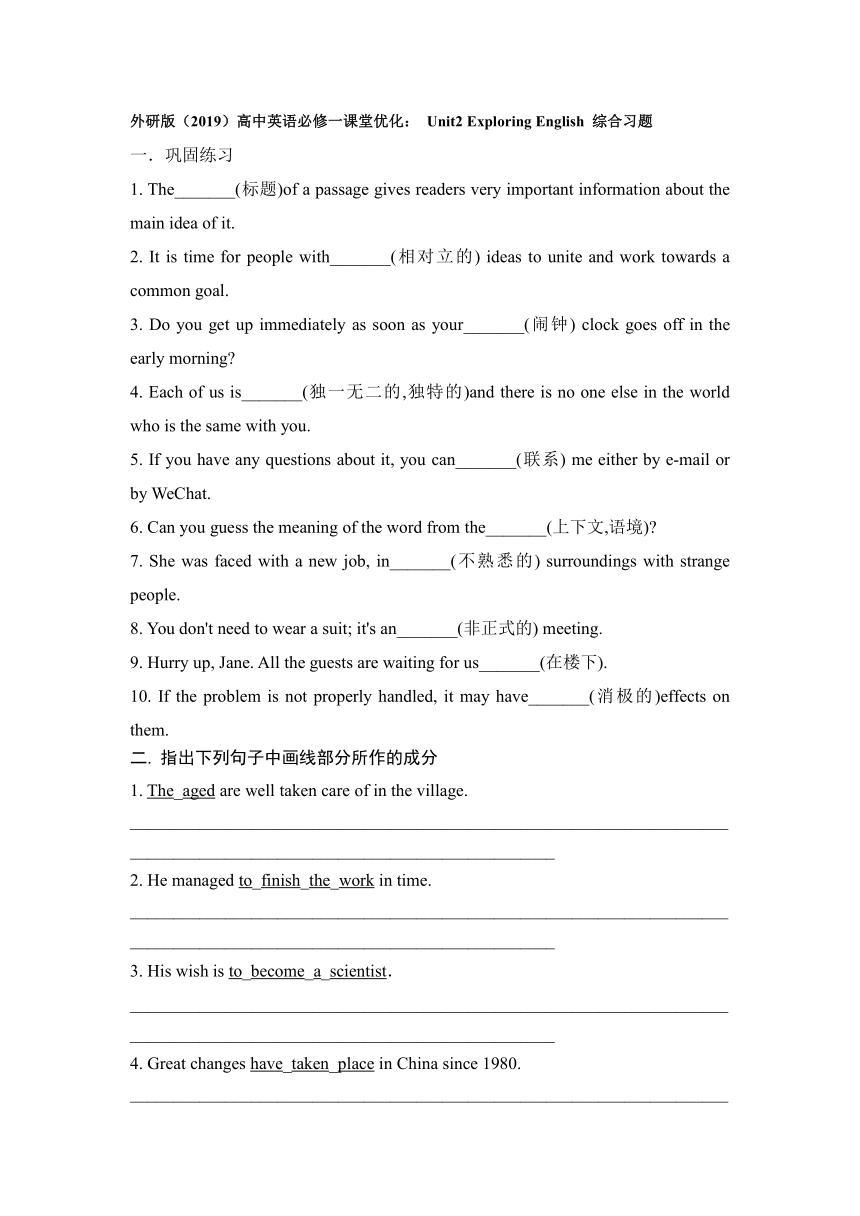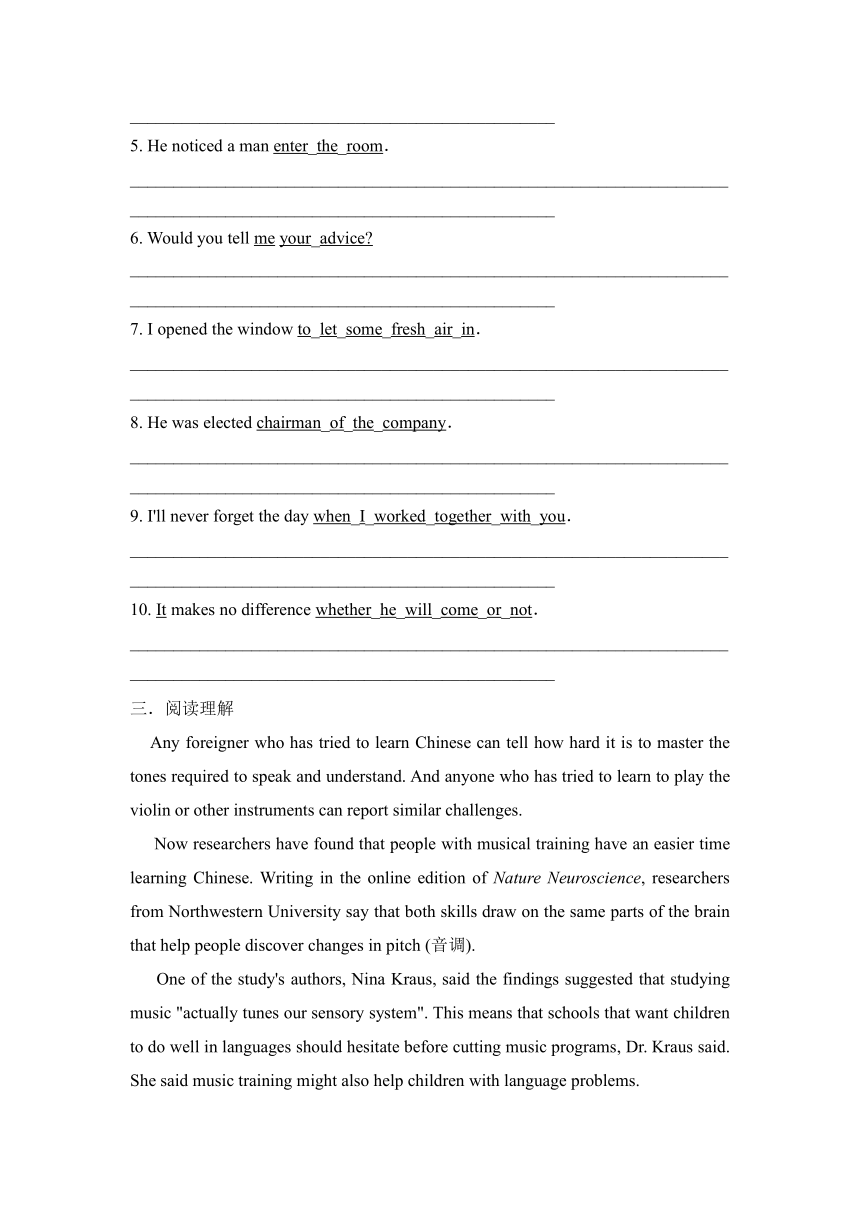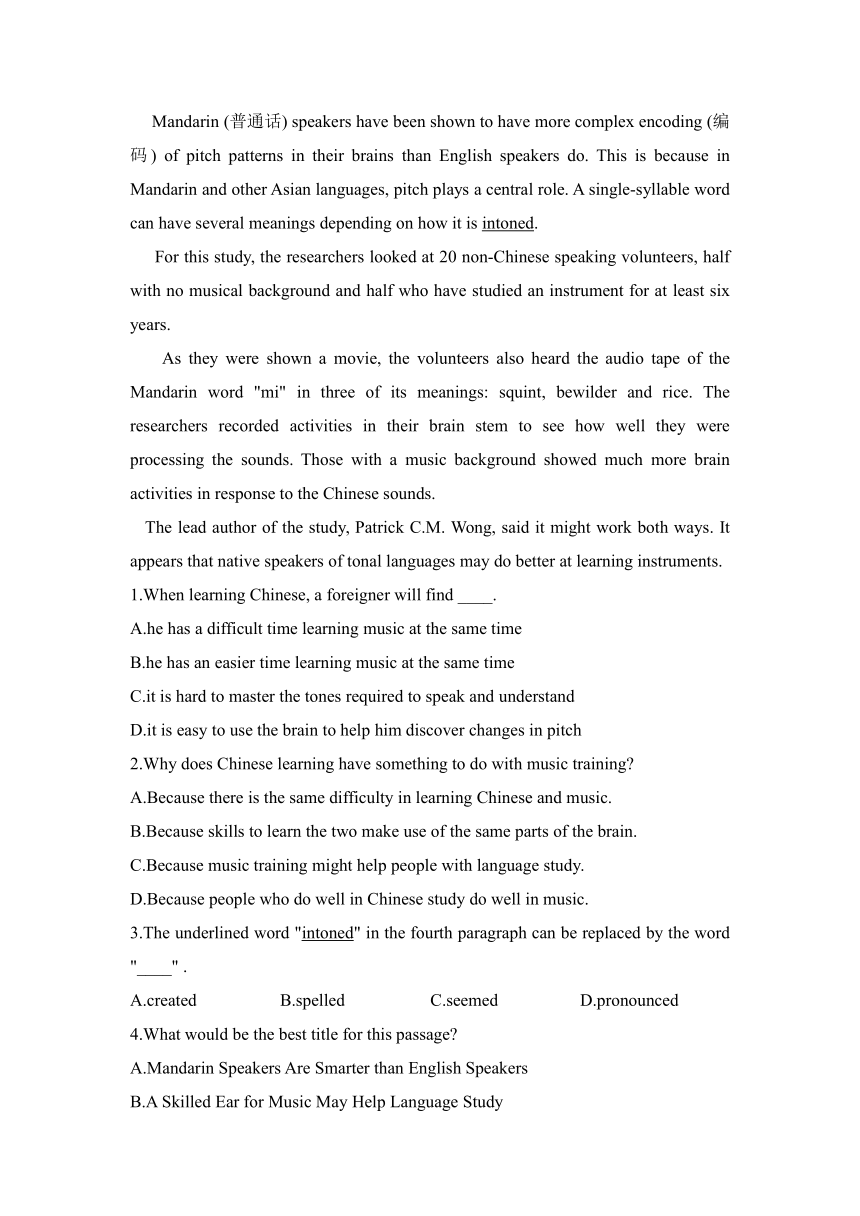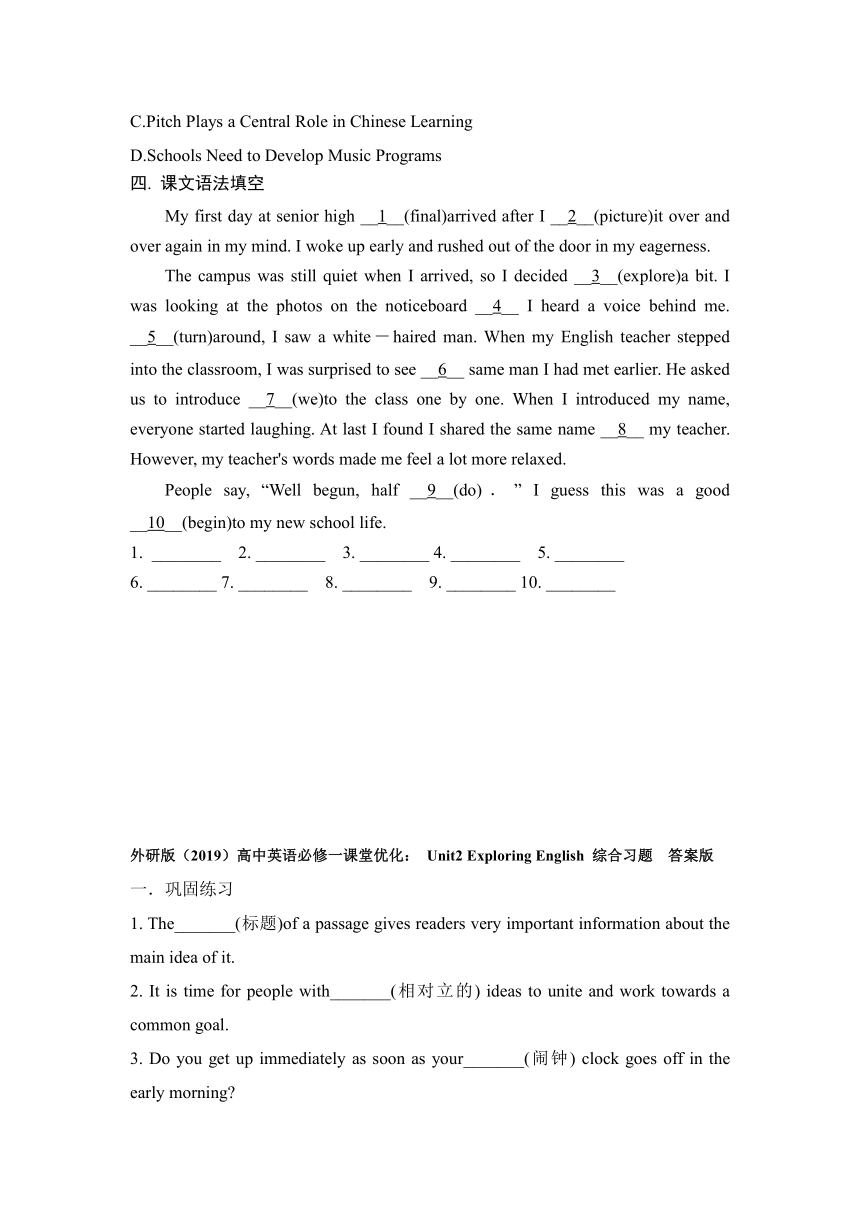外研版(2019)高中英语必修一课堂优化: Unit2 Exploring English 综合习题(Word版含答案)
文档属性
| 名称 | 外研版(2019)高中英语必修一课堂优化: Unit2 Exploring English 综合习题(Word版含答案) |  | |
| 格式 | docx | ||
| 文件大小 | 29.3KB | ||
| 资源类型 | 教案 | ||
| 版本资源 | 外研版(2019) | ||
| 科目 | 英语 | ||
| 更新时间 | 2021-08-14 08:41:57 | ||
图片预览




文档简介
外研版(2019)高中英语必修一课堂优化: Unit2 Exploring English 综合习题
一.巩固练习
1. The_______(标题)of a passage gives readers very important information about the main idea of it.
2. It is time for people with_______(相对立的) ideas to unite and work towards a common goal.
3. Do you get up immediately as soon as your_______(闹钟) clock goes off in the early morning?
4. Each of us is_______(独一无二的,独特的)and there is no one else in the world who is the same with you.
5. If you have any questions about it, you can_______(联系) me either by e-mail or by WeChat.
6. Can you guess the meaning of the word from the_______(上下文,语境)?
7. She was faced with a new job, in_______(不熟悉的) surroundings with strange people.
8. You don't need to wear a suit; it's an_______(非正式的) meeting.
9. Hurry up, Jane. All the guests are waiting for us_______(在楼下).
10. If the problem is not properly handled, it may have_______(消极的)effects on them.
二. 指出下列句子中画线部分所作的成分
1. The_aged are well taken care of in the village.
______________________________________________________________________________________________________________________
2. He managed to_finish_the_work in time.
______________________________________________________________________________________________________________________
3. His wish is to_become_a_scientist.
______________________________________________________________________________________________________________________
4. Great changes have_taken_place in China since 1980.
______________________________________________________________________________________________________________________
5. He noticed a man enter_the_room.
______________________________________________________________________________________________________________________
6. Would you tell me your_advice?
______________________________________________________________________________________________________________________
7. I opened the window to_let_some_fresh_air_in.
______________________________________________________________________________________________________________________
8. He was elected chairman_of_the_company.
______________________________________________________________________________________________________________________
9. I'll never forget the day when_I_worked_together_with_you.
______________________________________________________________________________________________________________________
10. It makes no difference whether_he_will_come_or_not.
______________________________________________________________________________________________________________________
阅读理解
?? Any foreigner who has tried to learn Chinese can tell how hard it is to master the tones required to speak and understand. And anyone who has tried to learn to play the violin or other instruments can report similar challenges.
??? Now researchers have found that people with musical training have an easier time learning Chinese. Writing in the online edition of Nature Neuroscience, researchers from Northwestern University say that both skills draw on the same parts of the brain that help people discover changes in pitch (音调).
??? One of the study's authors, Nina Kraus, said the findings suggested that studying music "actually tunes our sensory system". This means that schools that want children to do well in languages should hesitate before cutting music programs, Dr. Kraus said. She said music training might also help children with language problems.
??? Mandarin (普通话) speakers have been shown to have more complex encoding (编码) of pitch patterns in their brains than English speakers do. This is because in Mandarin and other Asian languages, pitch plays a central role. A single-syllable word can have several meanings depending on how it is intoned.
??? For this study, the researchers looked at 20 non-Chinese speaking volunteers, half with no musical background and half who have studied an instrument for at least six years.
??? As they were shown a movie, the volunteers also heard the audio tape of the Mandarin word "mi" in three of its meanings: squint, bewilder and rice. The researchers recorded activities in their brain stem to see how well they were processing the sounds. Those with a music background showed much more brain activities in response to the Chinese sounds.
The lead author of the study, Patrick C.M. Wong, said it might work both ways. It appears that native speakers of tonal languages may do better at learning instruments.
1.When learning Chinese, a foreigner will find ____.
A.he has a difficult time learning music at the same time
B.he has an easier time learning music at the same time
C.it is hard to master the tones required to speak and understand
D.it is easy to use the brain to help him discover changes in pitch
2.Why does Chinese learning have something to do with music training?
A.Because there is the same difficulty in learning Chinese and music.
B.Because skills to learn the two make use of the same parts of the brain.
C.Because music training might help people with language study.
D.Because people who do well in Chinese study do well in music.
3.The underlined word "intoned" in the fourth paragraph can be replaced by the word "____" .
A.created B.spelled C.seemed D.pronounced
4.What would be the best title for this passage?
A.Mandarin Speakers Are Smarter than English Speakers
B.A Skilled Ear for Music May Help Language Study
C.Pitch Plays a Central Role in Chinese Learning
D.Schools Need to Develop Music Programs
四. 课文语法填空
My first day at senior high __1__(final)arrived after I __2__(picture)it over and over again in my mind. I woke up early and rushed out of the door in my eagerness.
The campus was still quiet when I arrived, so I decided __3__(explore)a bit. I was looking at the photos on the noticeboard __4__ I heard a voice behind me. __5__(turn)around, I saw a white-haired man. When my English teacher stepped into the classroom, I was surprised to see __6__ same man I had met earlier. He asked us to introduce __7__(we)to the class one by one. When I introduced my name, everyone started laughing. At last I found I shared the same name __8__ my teacher. However, my teacher's words made me feel a lot more relaxed.
People say, “Well begun, half __9__(do).” I guess this was a good __10__(begin)to my new school life.
________ 2. ________ 3. ________ 4. ________ 5. ________
6. ________ 7. ________ 8. ________ 9. ________ 10. ________
外研版(2019)高中英语必修一课堂优化: Unit2 Exploring English 综合习题 答案版
一.巩固练习
1. The_______(标题)of a passage gives readers very important information about the main idea of it.
2. It is time for people with_______(相对立的) ideas to unite and work towards a common goal.
3. Do you get up immediately as soon as your_______(闹钟) clock goes off in the early morning?
4. Each of us is_______(独一无二的,独特的)and there is no one else in the world who is the same with you.
5. If you have any questions about it, you can_______(联系) me either by e-mail or by WeChat.
6. Can you guess the meaning of the word from the_______(上下文,语境)?
7. She was faced with a new job, in_______(不熟悉的) surroundings with strange people.
8. You don't need to wear a suit; it's an_______(非正式的) meeting.
9. Hurry up, Jane. All the guests are waiting for us_______(在楼下).
10. If the problem is not properly handled, it may have_______(消极的)effects on them.
参考答案:
1. title 2. opposing 3. alarm 4. unique 5. contact
6. context 7. unfamiliar 8. informal 9. downstairs 10. negative
二. 指出下列句子中画线部分所作的成分
1. The_aged are well taken care of in the village.
______________________________________________________________________________________________________________________
2. He managed to_finish_the_work in time.
______________________________________________________________________________________________________________________
3. His wish is to_become_a_scientist.
______________________________________________________________________________________________________________________
4. Great changes have_taken_place in China since 1980.
______________________________________________________________________________________________________________________
5. He noticed a man enter_the_room.
______________________________________________________________________________________________________________________
6. Would you tell me your_advice?
______________________________________________________________________________________________________________________
7. I opened the window to_let_some_fresh_air_in.
______________________________________________________________________________________________________________________
8. He was elected chairman_of_the_company.
______________________________________________________________________________________________________________________
9. I'll never forget the day when_I_worked_together_with_you.
______________________________________________________________________________________________________________________
10. It makes no difference whether_he_will_come_or_not.
______________________________________________________________________________________________________________________
答案 1. 主语 2. 宾语 3. 表语 4. 谓语 5. 宾语补足语 6. me为间接宾语,your advice为直接宾语 7. 状语 8. 主语补足语 9. 定语 10. it为形式主语,whether he will come or not为真正的主语
阅读理解
?? Any foreigner who has tried to learn Chinese can tell how hard it is to master the tones required to speak and understand. And anyone who has tried to learn to play the violin or other instruments can report similar challenges.
??? Now researchers have found that people with musical training have an easier time learning Chinese. Writing in the online edition of Nature Neuroscience, researchers from Northwestern University say that both skills draw on the same parts of the brain that help people discover changes in pitch (音调).
??? One of the study's authors, Nina Kraus, said the findings suggested that studying music "actually tunes our sensory system". This means that schools that want children to do well in languages should hesitate before cutting music programs, Dr. Kraus said. She said music training might also help children with language problems.
??? Mandarin (普通话) speakers have been shown to have more complex encoding (编码) of pitch patterns in their brains than English speakers do. This is because in Mandarin and other Asian languages, pitch plays a central role. A single-syllable word can have several meanings depending on how it is intoned.
??? For this study, the researchers looked at 20 non-Chinese speaking volunteers, half with no musical background and half who have studied an instrument for at least six years.
??? As they were shown a movie, the volunteers also heard the audio tape of the Mandarin word "mi" in three of its meanings: squint, bewilder and rice. The researchers recorded activities in their brain stem to see how well they were processing the sounds. Those with a music background showed much more brain activities in response to the Chinese sounds.
The lead author of the study, Patrick C.M. Wong, said it might work both ways. It appears that native speakers of tonal languages may do better at learning instruments.
1.When learning Chinese, a foreigner will find ____.
A.he has a difficult time learning music at the same time
B.he has an easier time learning music at the same time
C.it is hard to master the tones required to speak and understand
D.it is easy to use the brain to help him discover changes in pitch
2.Why does Chinese learning have something to do with music training?
A.Because there is the same difficulty in learning Chinese and music.
B.Because skills to learn the two make use of the same parts of the brain.
C.Because music training might help people with language study.
D.Because people who do well in Chinese study do well in music.
3.The underlined word "intoned" in the fourth paragraph can be replaced by the word "____" .
A.created B.spelled C.seemed D.pronounced
4.What would be the best title for this passage?
A.Mandarin Speakers Are Smarter than English Speakers
B.A Skilled Ear for Music May Help Language Study
C.Pitch Plays a Central Role in Chinese Learning
D.Schools Need to Develop Music Programs
1-4 CBDB
四. 课文语法填空
My first day at senior high __1__(final)arrived after I __2__(picture)it over and over again in my mind. I woke up early and rushed out of the door in my eagerness.
The campus was still quiet when I arrived, so I decided __3__(explore)a bit. I was looking at the photos on the noticeboard __4__ I heard a voice behind me. __5__(turn)around, I saw a white-haired man. When my English teacher stepped into the classroom, I was surprised to see __6__ same man I had met earlier. He asked us to introduce __7__(we)to the class one by one. When I introduced my name, everyone started laughing. At last I found I shared the same name __8__ my teacher. However, my teacher's words made me feel a lot more relaxed.
People say, “Well begun, half __9__(do).” I guess this was a good __10__(begin)to my new school life.
________ 2. ________ 3. ________ 4. ________ 5. ________
6. ________ 7. ________ 8. ________ 9. ________ 10. ________
答案 1. finally 2. had pictured 3. to explore 4. when 5. Turning
6. the 7. ourselves 8. with 9. done 10. beginning
一.巩固练习
1. The_______(标题)of a passage gives readers very important information about the main idea of it.
2. It is time for people with_______(相对立的) ideas to unite and work towards a common goal.
3. Do you get up immediately as soon as your_______(闹钟) clock goes off in the early morning?
4. Each of us is_______(独一无二的,独特的)and there is no one else in the world who is the same with you.
5. If you have any questions about it, you can_______(联系) me either by e-mail or by WeChat.
6. Can you guess the meaning of the word from the_______(上下文,语境)?
7. She was faced with a new job, in_______(不熟悉的) surroundings with strange people.
8. You don't need to wear a suit; it's an_______(非正式的) meeting.
9. Hurry up, Jane. All the guests are waiting for us_______(在楼下).
10. If the problem is not properly handled, it may have_______(消极的)effects on them.
二. 指出下列句子中画线部分所作的成分
1. The_aged are well taken care of in the village.
______________________________________________________________________________________________________________________
2. He managed to_finish_the_work in time.
______________________________________________________________________________________________________________________
3. His wish is to_become_a_scientist.
______________________________________________________________________________________________________________________
4. Great changes have_taken_place in China since 1980.
______________________________________________________________________________________________________________________
5. He noticed a man enter_the_room.
______________________________________________________________________________________________________________________
6. Would you tell me your_advice?
______________________________________________________________________________________________________________________
7. I opened the window to_let_some_fresh_air_in.
______________________________________________________________________________________________________________________
8. He was elected chairman_of_the_company.
______________________________________________________________________________________________________________________
9. I'll never forget the day when_I_worked_together_with_you.
______________________________________________________________________________________________________________________
10. It makes no difference whether_he_will_come_or_not.
______________________________________________________________________________________________________________________
阅读理解
?? Any foreigner who has tried to learn Chinese can tell how hard it is to master the tones required to speak and understand. And anyone who has tried to learn to play the violin or other instruments can report similar challenges.
??? Now researchers have found that people with musical training have an easier time learning Chinese. Writing in the online edition of Nature Neuroscience, researchers from Northwestern University say that both skills draw on the same parts of the brain that help people discover changes in pitch (音调).
??? One of the study's authors, Nina Kraus, said the findings suggested that studying music "actually tunes our sensory system". This means that schools that want children to do well in languages should hesitate before cutting music programs, Dr. Kraus said. She said music training might also help children with language problems.
??? Mandarin (普通话) speakers have been shown to have more complex encoding (编码) of pitch patterns in their brains than English speakers do. This is because in Mandarin and other Asian languages, pitch plays a central role. A single-syllable word can have several meanings depending on how it is intoned.
??? For this study, the researchers looked at 20 non-Chinese speaking volunteers, half with no musical background and half who have studied an instrument for at least six years.
??? As they were shown a movie, the volunteers also heard the audio tape of the Mandarin word "mi" in three of its meanings: squint, bewilder and rice. The researchers recorded activities in their brain stem to see how well they were processing the sounds. Those with a music background showed much more brain activities in response to the Chinese sounds.
The lead author of the study, Patrick C.M. Wong, said it might work both ways. It appears that native speakers of tonal languages may do better at learning instruments.
1.When learning Chinese, a foreigner will find ____.
A.he has a difficult time learning music at the same time
B.he has an easier time learning music at the same time
C.it is hard to master the tones required to speak and understand
D.it is easy to use the brain to help him discover changes in pitch
2.Why does Chinese learning have something to do with music training?
A.Because there is the same difficulty in learning Chinese and music.
B.Because skills to learn the two make use of the same parts of the brain.
C.Because music training might help people with language study.
D.Because people who do well in Chinese study do well in music.
3.The underlined word "intoned" in the fourth paragraph can be replaced by the word "____" .
A.created B.spelled C.seemed D.pronounced
4.What would be the best title for this passage?
A.Mandarin Speakers Are Smarter than English Speakers
B.A Skilled Ear for Music May Help Language Study
C.Pitch Plays a Central Role in Chinese Learning
D.Schools Need to Develop Music Programs
四. 课文语法填空
My first day at senior high __1__(final)arrived after I __2__(picture)it over and over again in my mind. I woke up early and rushed out of the door in my eagerness.
The campus was still quiet when I arrived, so I decided __3__(explore)a bit. I was looking at the photos on the noticeboard __4__ I heard a voice behind me. __5__(turn)around, I saw a white-haired man. When my English teacher stepped into the classroom, I was surprised to see __6__ same man I had met earlier. He asked us to introduce __7__(we)to the class one by one. When I introduced my name, everyone started laughing. At last I found I shared the same name __8__ my teacher. However, my teacher's words made me feel a lot more relaxed.
People say, “Well begun, half __9__(do).” I guess this was a good __10__(begin)to my new school life.
________ 2. ________ 3. ________ 4. ________ 5. ________
6. ________ 7. ________ 8. ________ 9. ________ 10. ________
外研版(2019)高中英语必修一课堂优化: Unit2 Exploring English 综合习题 答案版
一.巩固练习
1. The_______(标题)of a passage gives readers very important information about the main idea of it.
2. It is time for people with_______(相对立的) ideas to unite and work towards a common goal.
3. Do you get up immediately as soon as your_______(闹钟) clock goes off in the early morning?
4. Each of us is_______(独一无二的,独特的)and there is no one else in the world who is the same with you.
5. If you have any questions about it, you can_______(联系) me either by e-mail or by WeChat.
6. Can you guess the meaning of the word from the_______(上下文,语境)?
7. She was faced with a new job, in_______(不熟悉的) surroundings with strange people.
8. You don't need to wear a suit; it's an_______(非正式的) meeting.
9. Hurry up, Jane. All the guests are waiting for us_______(在楼下).
10. If the problem is not properly handled, it may have_______(消极的)effects on them.
参考答案:
1. title 2. opposing 3. alarm 4. unique 5. contact
6. context 7. unfamiliar 8. informal 9. downstairs 10. negative
二. 指出下列句子中画线部分所作的成分
1. The_aged are well taken care of in the village.
______________________________________________________________________________________________________________________
2. He managed to_finish_the_work in time.
______________________________________________________________________________________________________________________
3. His wish is to_become_a_scientist.
______________________________________________________________________________________________________________________
4. Great changes have_taken_place in China since 1980.
______________________________________________________________________________________________________________________
5. He noticed a man enter_the_room.
______________________________________________________________________________________________________________________
6. Would you tell me your_advice?
______________________________________________________________________________________________________________________
7. I opened the window to_let_some_fresh_air_in.
______________________________________________________________________________________________________________________
8. He was elected chairman_of_the_company.
______________________________________________________________________________________________________________________
9. I'll never forget the day when_I_worked_together_with_you.
______________________________________________________________________________________________________________________
10. It makes no difference whether_he_will_come_or_not.
______________________________________________________________________________________________________________________
答案 1. 主语 2. 宾语 3. 表语 4. 谓语 5. 宾语补足语 6. me为间接宾语,your advice为直接宾语 7. 状语 8. 主语补足语 9. 定语 10. it为形式主语,whether he will come or not为真正的主语
阅读理解
?? Any foreigner who has tried to learn Chinese can tell how hard it is to master the tones required to speak and understand. And anyone who has tried to learn to play the violin or other instruments can report similar challenges.
??? Now researchers have found that people with musical training have an easier time learning Chinese. Writing in the online edition of Nature Neuroscience, researchers from Northwestern University say that both skills draw on the same parts of the brain that help people discover changes in pitch (音调).
??? One of the study's authors, Nina Kraus, said the findings suggested that studying music "actually tunes our sensory system". This means that schools that want children to do well in languages should hesitate before cutting music programs, Dr. Kraus said. She said music training might also help children with language problems.
??? Mandarin (普通话) speakers have been shown to have more complex encoding (编码) of pitch patterns in their brains than English speakers do. This is because in Mandarin and other Asian languages, pitch plays a central role. A single-syllable word can have several meanings depending on how it is intoned.
??? For this study, the researchers looked at 20 non-Chinese speaking volunteers, half with no musical background and half who have studied an instrument for at least six years.
??? As they were shown a movie, the volunteers also heard the audio tape of the Mandarin word "mi" in three of its meanings: squint, bewilder and rice. The researchers recorded activities in their brain stem to see how well they were processing the sounds. Those with a music background showed much more brain activities in response to the Chinese sounds.
The lead author of the study, Patrick C.M. Wong, said it might work both ways. It appears that native speakers of tonal languages may do better at learning instruments.
1.When learning Chinese, a foreigner will find ____.
A.he has a difficult time learning music at the same time
B.he has an easier time learning music at the same time
C.it is hard to master the tones required to speak and understand
D.it is easy to use the brain to help him discover changes in pitch
2.Why does Chinese learning have something to do with music training?
A.Because there is the same difficulty in learning Chinese and music.
B.Because skills to learn the two make use of the same parts of the brain.
C.Because music training might help people with language study.
D.Because people who do well in Chinese study do well in music.
3.The underlined word "intoned" in the fourth paragraph can be replaced by the word "____" .
A.created B.spelled C.seemed D.pronounced
4.What would be the best title for this passage?
A.Mandarin Speakers Are Smarter than English Speakers
B.A Skilled Ear for Music May Help Language Study
C.Pitch Plays a Central Role in Chinese Learning
D.Schools Need to Develop Music Programs
1-4 CBDB
四. 课文语法填空
My first day at senior high __1__(final)arrived after I __2__(picture)it over and over again in my mind. I woke up early and rushed out of the door in my eagerness.
The campus was still quiet when I arrived, so I decided __3__(explore)a bit. I was looking at the photos on the noticeboard __4__ I heard a voice behind me. __5__(turn)around, I saw a white-haired man. When my English teacher stepped into the classroom, I was surprised to see __6__ same man I had met earlier. He asked us to introduce __7__(we)to the class one by one. When I introduced my name, everyone started laughing. At last I found I shared the same name __8__ my teacher. However, my teacher's words made me feel a lot more relaxed.
People say, “Well begun, half __9__(do).” I guess this was a good __10__(begin)to my new school life.
________ 2. ________ 3. ________ 4. ________ 5. ________
6. ________ 7. ________ 8. ________ 9. ________ 10. ________
答案 1. finally 2. had pictured 3. to explore 4. when 5. Turning
6. the 7. ourselves 8. with 9. done 10. beginning
